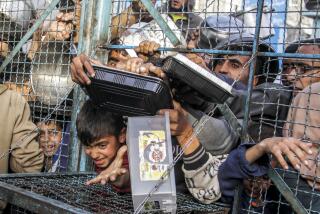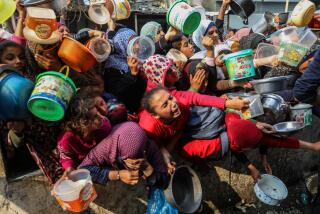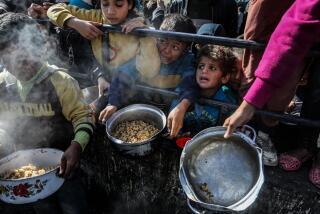In troubled Pakistan, a humanitarian light shines through
He owns a single set of clothing and often sleeps in a storage room — even though millions of dollars pass through his hands annually. At 83, creature comforts don’t matter much to Abdul Sattar Edhi. He is far too busy caring for the sick, feeding the hungry, burying the dead.
Known to some as Pakistan’s Mother Teresa, Edhi is a humanitarian light in a violent and troubled land. The vast majority here struggle daily in a moribund economy. Natural disasters are common. Poverty, political instability, corruption, and attacks by Islamic militants, criminals and political enforcers are facts of life.
In this environment, a shrinking violet won’t make much headway, he says. You’ve got to be tough.
Gruff and confident, Edhi refers to himself as a bhikhari, or beggar, and he wears his worn black tunic as a badge of honor. He has a picture of Karl Marx, as well as Mother Teresa, on his office wall. He has been condemned by some Pakistanis as a communist, a madman, an Israeli agent or a bad Muslim for his work with “infidels” — his charity does not discriminate by religion, race or gender.
He counters that his true religion is human rights. That the government is hopelessly inefficient, and most social workers corrupt. That politicians and religious leaders know they can exploit the poor. That foreign contributions usually come with unacceptable conditions.
And then there are Pakistan’s rich, who seek him out in hope of absorbing some of his reflected glory. Even as he welcomes their donations, he chides them for their priorities and their motives.
A few months ago, he says, a Pakistani industrialist asked him at a reception what he could do for humanity.
“I told him, ‘Pay your taxes and stop wasting money on luxuries and sipping tea,’” he says. “That was it. He ran right away.”
Donations to the Edhi Foundation fund hundreds of centers nationwide for orphans, senior citizens, drug abusers, the mentally disabled, abused women, even injured animals. It operates hospitals, mobile dispensaries, free kitchens, helicopters, airplanes and hundreds of “little white” ambulances resembling oversize bread boxes.
His foundation has been chided for its less-than-exact approach to accounting, but the public keeps contributing, a reflection, supporters say, of how much Pakistanis trust him. But that also creates something of a Catch-22. As he fills the vacuum, the state has even less incentive to step up.
“If the government did anything, we wouldn’t need to rely on people like Edhi,” said Mohammad Arif, who sells lace and buttons in Karachi.
In the words of Hussein Manzoor, 47, who sold fruit until his cart was stolen recently, Edhi is a “godsend.” Manzoor visited a free dispensary operated by Edhi in Karachi for treatment of an allergy that developed after an earthquake in Kashmir in 2005. Twelve relatives died, but he survived and moved to Karachi. Without his cart, Manzoor is struggling to support three children, but he is grateful to be alive.
“He’s chosen to work among the poorest of the poor,” said Mazhar Zaidi, a documentary filmmaker. “Others put a water tap in villages and go home. They don’t live there.”
In fact, the octogenarian often sleeps in a cluttered storeroom of his office, relegated there by his wife, Bilquis, a nurse who is also a key figure in the charity. “My wife kicked me out, so I stay here,” he says with a laugh.
For decades, Edhi’s popularity in this country of 170 million people has allowed his ambulances to brave riots, gun fights and ethnic battles. Thieves, political goons and even the Taliban have offered contributions and free passage. But in a worrisome sign underscoring Pakistan’s deterioration, his ambulances were shot at and a rescue worker wounded in July during rioting in Karachi.
Ambulance dispatchers field 6,000 calls a day in Karachi and route patrolling vehicles by radio, boasting a 10-minute response time in Pakistan’s biggest city. It was an Edhi ambulance that picked up the body of American journalist Daniel Pearl, who was killed by Al Qaeda here in 2002.
Reflecting the breadth of services Edhi provides, ambulance drivers wait outside a downtown Karachi control center beside a steel cage filled with goats, four-legged donations-in-waiting that benefactors can buy for the poor.
There also is a steel basinet where mothers can leave unwanted babies, night or day.
“Recently we’re not seeing so many left,” dispatch supervisor Aftab Husain said. “More babies are showing up in garbage cans again. We’re not sure why, since everyone knows Edhi.”
Edhi’s trademark service has been washing unclaimed bodies to prepare them for burial in keeping with Islamic tradition, something until recently he often did himself. Some question the logic of diverting resources to the dead, but he says it’s important for religious reasons and to emphasize dignity for all.
His fame has attracted imitators, leading to occasional fights over bodies among ambulance crews from rival charities seeking media credit and contributions.
His crews are instructed to defer because the corpses end up at mortuaries Edhi runs anyway. “It’s just driver stupidity,” he says with a dismissive wave.
Edhi was born to a civic-minded family that left India’s western Gujarat state in 1947, arriving in Pakistan by boat six days after the wrenching partition of India took effect.
After traveling and trying odd jobs, a time when he says in his autobiography that he became aware of his “weakness for beauty” in women, he settled into full-time humanitarian work, opening his first free dispensary in 1951. He gradually expanded from a single Karachi neighborhood to all of Pakistan and beyond.
His foundation now operates in Africa, Asia, Europe, Australia and North America, with most U.S. help earmarked for poor Asians needing medical or burial services, financial assistance, or help tracking down lost or runaway children. It also donated $100,000 to Hurricane Katrina relief efforts.
The U.S. arm has come under official scrutiny, and even though Edhi has a U.S. green card, he says he has been grilled by U.S. and Canadian immigration authorities when he has traveled to North America since the Sept. 11 attacks.
He sees this as part of a general suspicion of anyone from Pakistan these days. “They don’t give a reason,” he said. When Pakistan suffered devastating floods in 2010, the U.S. offered to donate $100,000 to his relief effort, he said, “but they still give us visa trouble.”
He takes no foreign funding unless it comes without strings and says he has turned down millions in U.S. aid. He also refuses contributions from the Pakistani government other than buying land for the charity at preferential prices.
He’s watched the early promise of Pakistan implode and says he doesn’t believe democracy can work here. Pakistan needs a military strongman able to stem chaos, corruption and sloth, he says, paving the way for eventual civilian rule.
Some find this simplistic.
“It’s naive, especially given Pakistan’s history, to think that once in power the military would willingly give it up,” said Zaidi, the filmmaker.
Edhi’s wife and their four children, two sons and two daughters, have joined as trustees and managers of various branches, assuming a greater role as he has aged. Bilquis said in an interview several years ago that the children were fully capable of taking over.
But given how much the charity embodies Edhi’s personality, some wonder whether it will remain vibrant after his death.
“God willing, I certainly hope so,” said Mohammad Omar, 40, a costume jewelry dealer working near Edhi’s office. “He’s done so much for Pakistan.”
More to Read
Start your day right
Sign up for Essential California for news, features and recommendations from the L.A. Times and beyond in your inbox six days a week.
You may occasionally receive promotional content from the Los Angeles Times.






